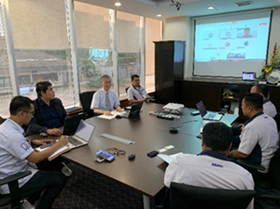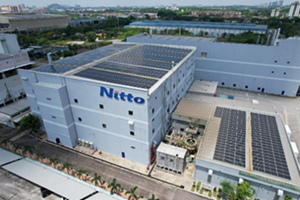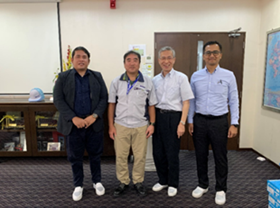
ECCJ held a FY2024 AJEEP CN project start-up meeting
Under the entrustment of the Agency for Natural Resources and Energy (ANRE), the Energy Conservation Center, Japan (ECCJ) has been implementing the AJEEP Scheme 5 multilateral EE&C capacity building cooperation project for ASEAN countries. As a summary of the CN diagnosis conducted in the last fiscal year, a start-up meeting was held at NITTO DENKO Materials (NMM) in Malaysia on September 4-5, 2024, where a med- to long-term plan for CN was formulated, aiming for Net Zero by FY2050. The plan was approved by the company executives, and the CN project has been launched.
 |  |  |
Meeting view | Rooftop solar panel | ACE, NMM President, ECCJ,EC |
As part of AJEEP Scheme 5 activities, the CN diagnosis was implemented for the first time last year at NITTO DENKO Materials in Malaysia.
The med- to long-term plan was formulated based on the reports of diagnosis results after the presentation of the CN diagnosis report within ASEAN. The main purpose of this meeting was to have the med- to long-term plan approved by the company’s executives and to launch the CN project as a company.
The person in charge of the CN diagnosis at NMM explained its results and the proposed medium- to long-term plan.
(1) Final target for CN in FY2050 is Net Zero
(2) Develop an activity plan based on the results of this CN diagnosis
(3) Installation of solar panels as a CN measure was completed last November.
(4) Establish a CN promotion organization with the president at the top leader, and manage the progress once a year.
(5) ACE, Energy Commission (EC), and ECCJ will participate and support as needed.
The med- to long-term plan was approved by the company executives after the explanation and the Q&A session.
This marks the conclusion of the CN diagnosis activities under AJEEP Scheme 5, but for NMM, it signifies the beginning of the CN project.
Support was provided for the capacity development of formulating the CN projects through the dispatch of experts, who offered guidance on implementing CN diagnosis using actual equipment, instruction on data analysis methods, assistance in preparing diagnosis reports, and instruction on the concepts behind formulating med- to long-term plans, among other forms of support. Although this was the first CN diagnosis under Scheme 5, initial results were achieved, and this experience will be applied to the CN diagnosis for the current fiscal year.

